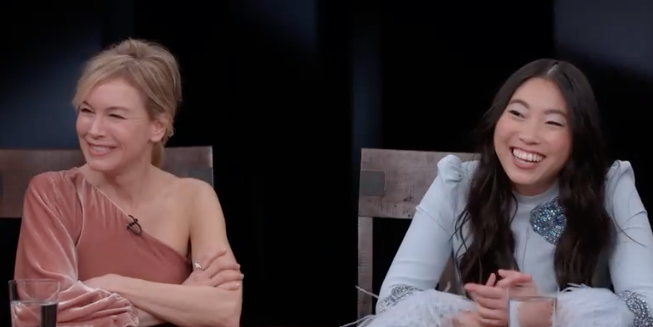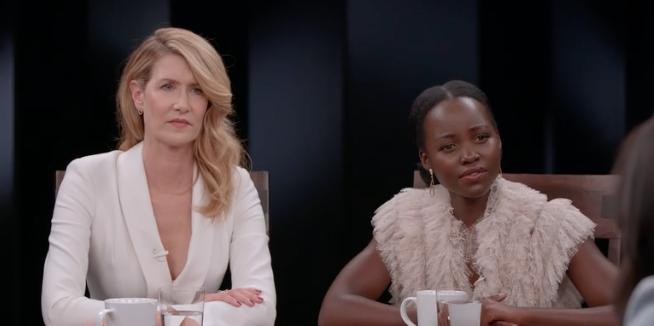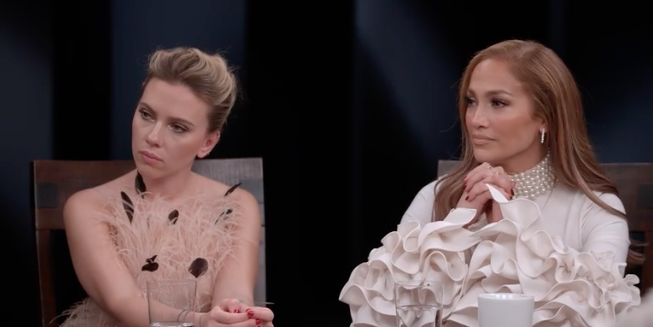Amidst the major buzz they’re generating this awards season, Jennifer Lopez, Scarlett Johansson, Lupita Nyong’o, Awkwafina, Laura Dern, and Renée Zellweger recently sat down with The Hollywood Reporter for its Drama Actress roundtable. Each of them has portrayed a woman at a crossroads of sorts in an awards contender this year — two, in Johansson and Dern’s case.
Set against the backdrop of the financial crash, Lorene Scafaria’s “Hustlers” sees Lopez leading a group of fellow strippers in a scheme to rip off their Wall Street bro clients. Johansson is one half of the couple in divorce drama “Marriage Story,” as well as the young mother trying to resist the Nazis while raising a son in Hitler Youth in “Jojo Rabbit.” Nyong’o’s Adelaide faces off against her doppelgänger in horror pic “Us,” while Awkwafina says goodbye to her terminally ill grandmother, under the guise of a family wedding, in Lulu Wang’s “The Farewell.” Zellweger portrays Judy Garland during the final months of her life in biopic “Judy.” And Dern plays the lawyer representing Johansson in “Marriage Story” and takes on the role of Marmee, a woman raising four daughters on her own during the Civil War, in Greta Gerwig’s “Little Women.”
Imposter syndrome, working with women and underrepresented filmmakers, and the changes #MeToo and #TimesUp have inspired in Hollywood are among the topics that came up during the actresses’ chat.
Highlights from the conversation are below. You can read the full piece over at THR.
Zellweger and Awkwafina on how imposter syndrome affects their performances:
Zellweger: “It happens every time before you start. Your impostor syndrome sneaks in — this will be the time that everyone knows you’re a fraud and you’re going to get fired. It becomes less fear and probably more just a sense of responsibility as you get older, and I’ve been doing it a while. But it’s always part of the joy, because if it doesn’t frighten you, then [why do it?]”
Awkwafina: “[The fact that ‘The Farewell’ was my first dramatic role] added a lot of pressure. I was really, really scared, because you think you know what people think about you, but you don’t know what you can do [about it]. You create all these different scenarios in your head about the worst it can go, and the best it can go, and you want to strive for this kind of invisible best that never will come true. But that striving is what you run on, and without the neuroses, without the self-hatred, without the impostor syndrome, it would’ve been harder. But I think it was the character — I just really related to her.”
Dern and Awkwafina on working with women filmmakers:
Dern: “In the case of Greta [Gerwig], she was also adapting ‘Little Women’ [as well as directing, so] we wanted to honor Louisa May Alcott’s words and another time, seemingly. But she is so brilliantly trusting of how modern the story is, of how modern Louisa’s writing is, and how clear a revolutionary Louisa was through these characters — complicated and beautiful, different female characters — that she wrote … There is a rhythm to the language that she brings that is seemingly messy and joyful and complicated and angry and all of those things, but it’s very strategic.”
Awkwafina: “When I first started, the first two directors I worked with were women. And when I hear about the industry that existed — that [women directing films] was really rare — it’s mind-blowing for me. I can’t imagine not working with a woman at the helm of a project, like at all.”
Nyong’o on collaborating with underrepresented filmmakers and making inclusive projects:
“It’s definitely not a calculated thing. [Mira Nair, Jordan Peele, Steve McQueen, and Ryan Coogler] are all directors who have offered me the most interesting roles. And I’ve taken them. I haven’t really thought about the demographic of the director I’ve been working with. This #MeToo time, this Time’s Up time in the industry, is about allowing for equitable representation. And because I am a black woman, I am a beneficiary of that movement in the work that I’ve been able to do. I’m very grateful to have come into the industry at the time that I have because I am benefiting from the efforts of a lot of other women who have come before me, other black women who have had it a lot rougher than I have. This is a time where there is a concerted effort to consider diversity and inclusion. What I really want is for it to not be a fad, not be a trend. Right now it’s really dope and cool and on trend to work with women and underrepresented groups, but the moment of maturity in the industry is when it is just the norm, you know?”
Lopez, Johansson, Dern, Nyong’o, and Zellweger on how the industry’s treatment of women has evolved, especially since #MeToo:
Johansson: “The climate is so different now, there’s so many wonderful opportunities for women of every age to play all different types of people. When I was working in my early 20s and even my late teens, I felt that I got somehow typecast as hypersexualized, which I guess at the time seemed OK to everyone — it was another time — even though it wasn’t part of my own narrative. It was kind of crafted for me by probably a bunch of dudes in the industry.
But it was really difficult for me to try to figure out how to get out of being an ingenue or the ‘other woman’ because it was never anything that I had intended. I had to shake it up a little bit. I remember thinking at the time that maybe I needed a different job in this industry that would be more fulfilling, because it seemed like there was nowhere to go. And so I actually had the opportunity to do an Arthur Miller play on Broadway, and it totally reset my whole way of thinking about how I could work, and what different kinds of opportunities could be available to me.”
Zellweger: “As a young person starting out, I would get the cutoff-shorts jobs and the other woman, the one-night-stand girl, and I did about three or four of those little jobs in Texas while I was still at university. And I thought, ‘I think I’m going to not do this anymore because I know where that road will go. I don’t know what it’s going to look like ultimately, but I bet it would be really hard to get off that road.’ And there is the inevitability of your body changing and you growing older. I want to work in a way where I can portray women who are relatable throughout my life. I don’t want to have to stop at a particular time because I can’t wear the cutoffs anymore because it looks weird.”
Zellweger: “I hear the conversations and I’ve been in professional partnerships with men who make different choices now, even if it’s just to be clear about what their intentions are … I had one gentleman say, ‘I don’t meet with women alone. I always make sure that there’s somebody else in here because I don’t want anything to be misconstrued or misunderstood and I want her to be comfortable.’ So you see that there are different choices being made.”
Lopez: “We’ve stood up and said, ‘Hey, we don’t want this to be going on and it’s been going on a long time and it’s enough.’ On a more positive note, we have movies like ‘Hustlers’ and ‘Little Women’ and all these other movies where there’s women at the forefront, and we’re producing and we’re directing, we’re writing it, we’re editing it.”
Lopez: “A director at a fitting asked me to take my top off .. And I said no, I stood up for myself. But it was so funny because I remember being so panicked in the moment. And by the way, there was a costume designer in the room with me. So there was another woman in the room and he says this and I said no. Luckily a little bit of the Bronx came out, and I was like, ‘I don’t have to show you my — No. On the set, you see them.’ … If you give in, in that moment, all of a sudden that person is off and running, thinking they can do whatever they want. And because I put up a little boundary right there and said no, he laid off and then later on apologized. But the minute he walked out of the room the costume designer was like, ‘I’m so sorry, I’m so sorry that just happened.'”
Johansson: “I feel like that could still happen. I don’t think we’re far away from that at all. I was talking to some of our crew from the last film that I did, about inappropriate behavior in general, and they were talking about a particular DP that was doing all kinds of crazy stuff, shooting up skirts, and our first AD had to go over to the actress and say, ‘Hey, just so you know, maybe you want to check and see, because I think the camera angle is going to maybe not be something that you’re comfortable with.’ She had no idea.”
Nyong’o: “The difference now, though, is that because of the conversations that are happening in public, it’s easier to tell when something is inappropriate … Because in that moment, if the costume designer had said something, it could’ve changed. If she had supported you in some way, had spoken up, it would have changed the dynamic. So now we are programming the younger generation to know what’s OK and what’s not. To know that it’s not OK to be in a costume fitting and for a man to ask that of you. Even though those things might happen, our defense would be sharper in those moments.”
Dern: “I started auditioning at 10, 11 years old. I listen to the next generation, saying, ‘People used to have auditions in hotel rooms?’ I’m like, ‘Yeah, every single time, waiting in the lobby of a hotel and the director is waiting for you in the room to have a chemistry read.'”
Nyong’o: “Now there are intimacy coaches. I have not been asked to do much nudity in my career, but I’ve heard that now they have intimacy coaches on set, which I think is really great. When you have a fight scene, you have a fight coordinator, why not have an intimacy coordinator?”
Lopez, Nyong’o, and Awkwafina on the importance of diversity and representation on-screen:
Lopez: “When I first started, one of the things that I wanted to do, because I was Puerto Rican, Latina, was that I wanted to be in romantic comedies because I felt like all the women in romantic comedies always looked the same way, they were always white. And I was like, if I can do it and just show that I’m every girl — because I am the hopeless romantic, I am that — I am the single working woman, I was those things. And I remember thinking, I need to be the lead in a romantic comedy. And that’s one of the things I went for and that’s one of the things me and my agents talked about.”
Nyong’o: “That’s the thing — when the race of the person in the romantic comedy is not the point. There are moments when the cultural group or the religious group or the national group is the subject matter, and there are moments when it’s not, and both are radical, you know? … So like with Jordan [Peele, her ‘Us’ director,] in the horror genre, not often do you have black characters in the fore. So he is revolutionizing that genre — that black people don’t die first in his films. And [race] is really not the point. What is the point is that it’s an examination of class and privilege. The family that we are following in [‘Us’] is representational of the all-American family. And that you can relate to that person just as much as I related to Fräulein Maria in ‘The Sound of Music.’ That it is possible that we can see ourselves in the people who are different from us, from other cultures, other creeds.”
Awkwafina: “There is a genuine urge for audiences to want an industry that represents their life. That’s why I’m very positive about the direction that we’re going in. I don’t think that having people of different cultures or women will be a trend because I think that it’s what people want. We’re changing as a society.”
Dern and Nyong’o on inclusion being good business:
Dern: “I think [part of the reason society is changing is] because money matters and [inclusive projects are] making money.”
Nyong’o: “And the audience is louder. Now with social media, you can no longer just be in your little boardroom and say what the audiences are looking for. That was the folly — ‘Black films don’t sell. Oh, nobody wants to see a Latina do a comedy.'”
Dern: “Or like, ‘Women movies don’t make money.'”









